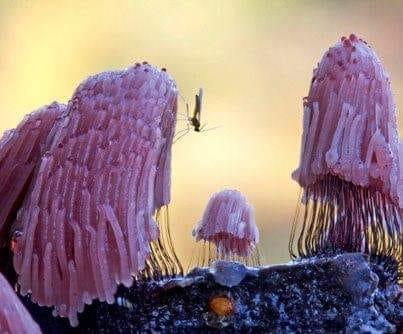Barely-alive creatures, such as the slime mold pictured, are able to produce “memories” — they just store them in their physical surroundings rather than a brain. “A slime mould is not a fungus or mould, but is in fact a protist, which is really the odds and ends of the natural world that don’t fit in with the rest of our taxonomic grouping system,” said PhD student Christopher Reid who led the study.
Is it possible to know where you’ve been when you don’t have a brain? Depending on your definition of “know,” the answer may be yes. Researchers have shown that the slime mold, an organism without anything that resembles a nervous system (or, for that matter, individual cells), is capable of impressive feats of navigation. It can even link food sources in optimally spaced networks. Now, researchers have shown it’s capable of filling its environment with indications of where it has already searched for food, allowing it to “remember” its past efforts and focus its attention on routes it hasn’t explored.
